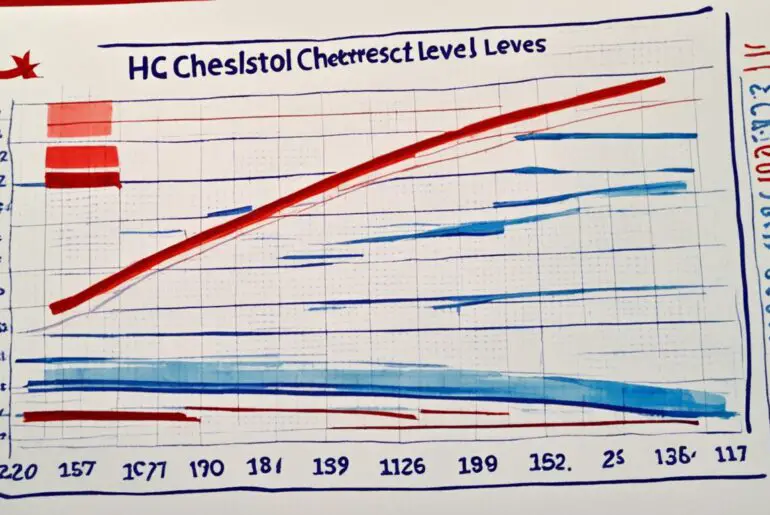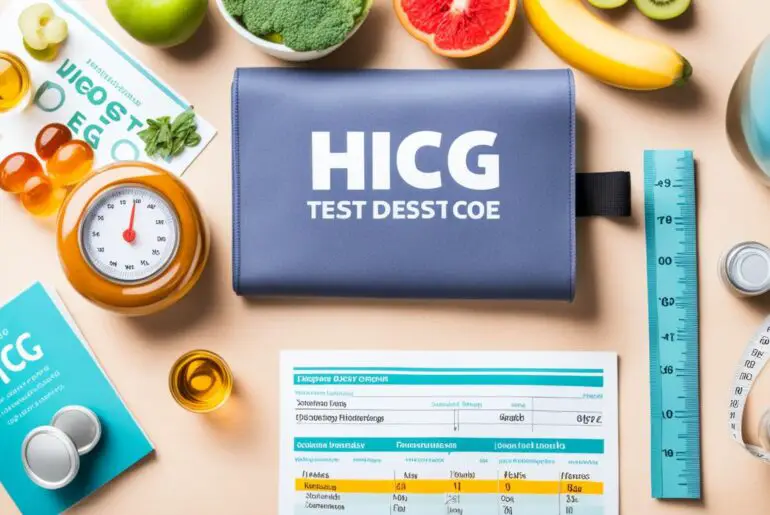Are you considering the HCG Diet to achieve your weight loss goals? While this protocol has gained popularity for its rapid results, there’s a crucial factor that often goes overlooked – hydration. Many dieters fail to realize the risks of dehydration on the HCG Diet and the importance of adequate water intake. So, before you embark on this weight loss journey, ask yourself: Are you drinking enough water?
Key Takeaways:
- Dehydration is a known side effect of the HCG Diet and can lead to electrolyte imbalances.
- Symptoms of dehydration include thirst, dry mouth, fatigue, dizziness, and muscle cramps.
- Adequate water intake is crucial to prevent dehydration and ensure a safe weight loss journey.
- Drinking mineral water containing essential electrolytes can help replenish electrolyte levels.
- Monitoring hydration signs such as urine color and body weight can help maintain proper hydration levels.
Understanding Dehydration on the HCG Diet
Dehydration is a common concern that individuals may experience while following the HCG Diet. It occurs when there is an inadequate amount of fluid in the body, leading to various symptoms and potential health risks. Recognizing the signs of dehydration is essential for proactive prevention and maintaining optimal health during your weight loss journey.
Dehydration symptoms:
- Thirst
- Dry mouth
- Fatigue
- Dizziness
- Muscle cramps
These symptoms can significantly impact your overall well-being and hinder your progress on the HCG Diet. It is crucial to prioritize proper hydration to prevent dehydration and its associated risks.
Preventing dehydration on the HCG Diet:
One of the most effective ways to prevent dehydration on the HCG Diet is by drinking enough water throughout the day. Adequate hydration not only helps maintain fluid balance but also supports overall bodily functions and promotes optimal weight loss. By staying well-hydrated, you can prevent the adverse effects of dehydration and maintain your energy levels while following the HCG Diet.
HCG Diet side effects:
Dehydration is one of the potential side effects of the HCG Diet. Failing to prioritize proper hydration can lead to electrolyte imbalances, low energy levels, and other health complications. By understanding the importance of staying hydrated and recognizing the symptoms of dehydration, you can take proactive measures to prevent side effects and ensure a safe and successful weight loss journey on the HCG Diet.
“Proper hydration is crucial for preventing dehydration symptoms and maintaining optimal health and energy levels while following the HCG Diet.”
| Dehydration Symptoms | Prevention Strategies |
|---|---|
| Thirst | Drink water regularly throughout the day |
| Dry mouth | Avoid excessive consumption of dehydrating substances (e.g., caffeine) |
| Fatigue | Ensure adequate rest and recovery |
| Dizziness | Stay well-hydrated and avoid sudden movements |
| Muscle cramps | Replenish electrolytes through mineral-rich foods and drinks |
Factors Contributing to Dehydration on the HCG Diet
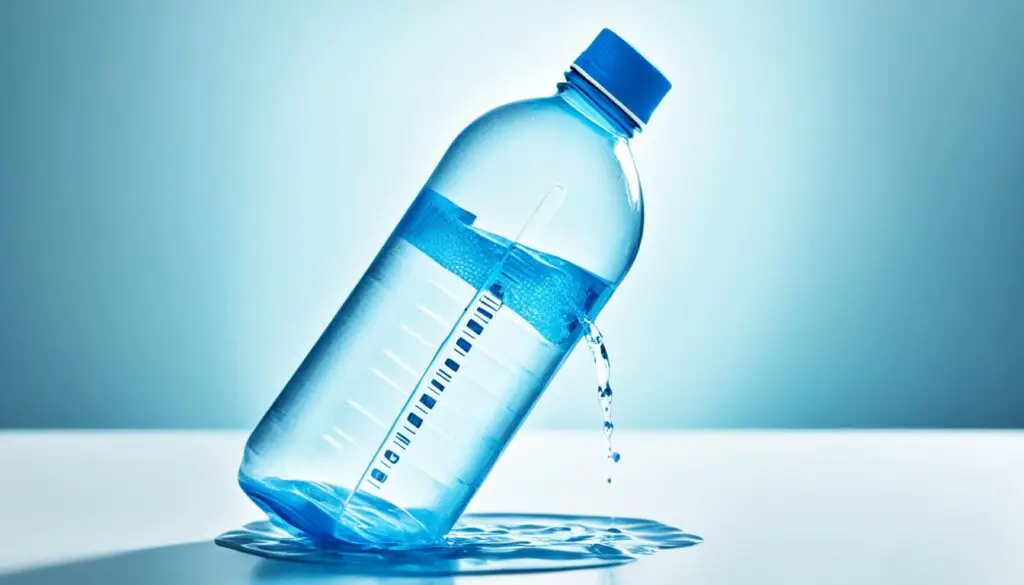
When following the HCG Diet, it’s important to understand the factors that contribute to dehydration. This low-calorie diet promotes accelerated fluid loss, which is primarily a result of the depletion of stored carbohydrates and the release of associated water. As your body utilizes its stored carbs, fluids are released, leading to noticeable weight loss. However, this fluid loss can also cause dehydration and electrolyte depletion, making it crucial to manage your hydration levels carefully.
Accelerated weight loss is one of the primary factors that contribute to dehydration on the HCG Diet. As the diet restricts calorie intake, the body turns to stored fat for energy, resulting in rapid weight loss. This accelerated weight loss is largely due to fluid loss, which can lead to dehydration if not addressed adequately.
Furthermore, the HCG Diet can also deplete electrolytes, which are essential minerals in the body that help maintain proper fluid balance and muscle function. Electrolyte depletion can occur as a result of the rapid weight loss and the restricted intake of certain foods on the diet. Electrolytes play a crucial role in hydration, and their depletion can further exacerbate the risk of dehydration.
Nutritional table: Electrolyte Content in Foods
| Food | Sodium (mg) | Potassium (mg) | Magnesium (mg) |
|---|---|---|---|
| Banana (medium) | 1 | 422 | 32 |
| Sweet Potato (1 cup, cooked) | 21 | 448 | 50 |
| Spinach (1 cup, cooked) | 157 | 839 | 156 |
| Avocado (1 medium) | 10 | 487 | 58 |
| Almonds (1 oz) | 0 | 200 | 76 |
The HCG Diet promotes accelerated weight loss, resulting in fluid loss and electrolyte depletion, which can contribute to dehydration. It’s important to be mindful of your hydration levels and replenish electrolytes to maintain a safe and healthy weight loss journey.
To mitigate the risk of dehydration while on the HCG Diet, it’s vital to prioritize fluid intake and ensure adequate hydration. Incorporating electrolyte-rich foods into your meals and snacks can help replenish these crucial minerals and support proper hydration levels. Additionally, considering an electrolyte supplement or consulting with a healthcare professional can provide further guidance on managing your fluid and electrolyte balance during the diet.
Hydration Strategies on the HCG Diet
Proper hydration is crucial on the HCG Diet to prevent dehydration and ensure a safe weight loss journey. Here are some effective strategies to stay hydrated:
- Drink Mineral Water: Opt for mineral water that contains essential electrolytes like sodium, potassium, and magnesium. Mineral water helps replenish electrolyte levels and supports hydration.
- Avoid Deionized and Distilled Water: Deionized and distilled water may lack essential minerals. It’s best to choose mineral-rich water options to maintain proper hydration.
- Add Sea Salt: Adding a small amount of sea salt to your water can help prevent electrolyte imbalances and relieve muscle cramps. Sea salt contains valuable minerals that support hydration.
By following these hydration tips, you can ensure that your body stays properly hydrated while on the HCG Diet. Proper hydration plays a key role in maintaining overall health and well-being during your weight loss journey.
Benefits of Mineral Water
Mineral water offers several benefits that support hydration and overall well-being on the HCG Diet. Here are some key advantages:
- Electrolyte Replenishment: Mineral water contains essential electrolytes, such as sodium, potassium, and magnesium. These electrolytes help replenish the body’s electrolyte levels, keeping you hydrated and maintaining vital bodily functions.
- Antioxidant Properties: Some mineral waters also possess antioxidant properties due to the presence of minerals like selenium and zinc. These antioxidants help protect the body from oxidative stress and promote overall health.
Including mineral water in your hydration routine can provide you with these additional benefits, making it a wise choice for staying hydrated on the HCG Diet.
| Mineral Water Brand | Electrolyte Content | Antioxidant Content |
|---|---|---|
| Brand A | High | Moderate |
| Brand B | Moderate | Low |
| Brand C | Low | High |
“Drinking an adequate amount of water and choosing mineral-rich options is key to maintaining proper hydration on the HCG Diet. Electrolyte replenishment and antioxidant benefits make mineral water an excellent choice.”
By implementing these hydration strategies and incorporating mineral water into your routine, you can ensure optimal hydration while on the HCG Diet, supporting your weight loss efforts and overall health.
Water Intake Guidelines on the HCG Diet

According to the HCG Diet protocol, it is recommended to consume a minimum of two liters or half a gallon of water per day. Adequate water intake is crucial for the breakdown and burning of stored fat in the body during the HCG Diet. This ensures optimal weight loss results and supports overall well-being.
It’s important to strike a balance when it comes to water consumption. While staying hydrated is essential, excessive water intake can be problematic. Drinking too much water can lead to a condition called water poisoning or hyponatremia, where the balance of electrolytes in the body is disrupted. It is important to consume an adequate amount of water without risking overhydration.
Suggested Water Intake Guidelines on the HCG Diet:
- Drink at least two liters or half a gallon of water per day.
- Spread water consumption throughout the day.
- Avoid gulping large amounts of water at once, as it may flush out important electrolytes.
- Consider dividing the water intake into four to six equal portions to drink throughout the day.
By following these guidelines, you can ensure proper hydration without compromising your weight loss progress on the HCG Diet.
Comparison table: Water Intake Recommendations on the HCG Diet
| Water Intake | Description |
|---|---|
| Minimum recommended intake | At least two liters or half a gallon per day |
| Optimal range | Two to three liters (64 to 96 ounces) per day |
| Excessive intake | More than three liters (96 ounces) per day |
It is important to listen to your body’s hydration needs and adjust your water intake accordingly. It’s always best to consult with a healthcare professional or a certified HCG Diet coach for personalized recommendations based on your specific needs and goals.
Choosing the Right Water on the HCG Diet
When it comes to selecting the right water to support hydration on the HCG Diet, there are a few important considerations. While plain water is always a good choice, mineral water offers additional benefits that can enhance your weight loss journey. Mineral water not only provides hydration but also contains essential electrolytes and antioxidants that can contribute to overall well-being.
However, it’s crucial to be mindful of the type of mineral water you choose. Some brands may add harmful additives or sweeteners like aspartame, which can have negative effects on your health and weight loss goals. To ensure you make the best choice, opt for mineral water that is free from these additives and instead focuses on natural mineral content.
The Benefits of Mineral Water
Mineral water contains a variety of minerals, such as magnesium, calcium, and potassium. These minerals play a crucial role in maintaining proper bodily functions, supporting cellular health, and promoting good overall health. By consuming mineral water, you can replenish electrolytes lost during the HCG Diet and support balanced hydration.
Additionally, mineral water is often sourced from natural springs, which means it benefits from the surrounding environment. Springs can provide water with unique mineral compositions, giving it a distinctive taste and potential therapeutic properties.
Incorporating mineral water into your HCG Diet can provide you with the following benefits:
- Hydration support
- Electrolyte replenishment
- Antioxidant intake
- Natural mineral content
Carbonated Water as an Alternative
If you prefer a refreshing variation from plain water, carbonated water can be a suitable option. Carbonated water offers a bubbly texture and can help satisfy your thirst. However, it’s essential to choose carbonated water without harmful additives or sweeteners. Instead, opt for carbonated water that is free from aspartame or other synthetic sweeteners.
Avoiding Aspartame Dangers
Aspartame is a commonly used artificial sweetener found in various diet drinks and processed foods. While it may seem like a low-calorie alternative, it has been associated with potential health risks. Studies have linked aspartame consumption to adverse effects such as headaches, dizziness, and even potential negative impacts on weight loss efforts.
To prioritize your health and maximize the benefits of the HCG Diet, it’s best to avoid drinks and foods containing aspartame. Instead, opt for natural alternatives, such as mineral water, that provide hydration without compromising your well-being.
| Mineral Water Benefits |
|---|
| Hydration support |
| Electrolyte replenishment |
| Antioxidant intake |
| Natural mineral content |
Signs of Proper Hydration on the HCG Diet
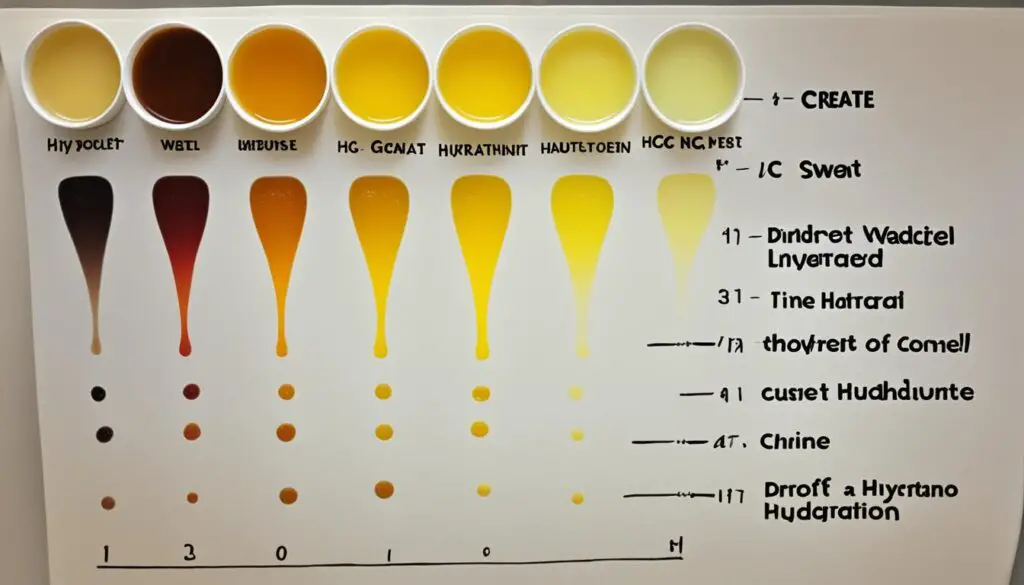
Monitoring hydration levels while on the HCG Diet is crucial. Proper hydration is essential for overall health and wellbeing. By paying attention to specific signs, you can ensure that you maintain proper hydration throughout your HCG Diet journey.
Pale Urine
One of the most reliable indicators of proper hydration is the color of your urine. When adequately hydrated, urine tends to be pale yellow or straw-colored. Dark yellow or amber-colored urine can indicate dehydration and a need to increase fluid intake.
Stable Body Weight
Weighing yourself regularly can also provide insights into your hydration status. Proper hydration helps maintain a consistent body weight. Sudden fluctuations in weight may signal fluid retention or dehydration. Monitoring your weight can help you gauge your hydration levels and make adjustments as needed.
Moist Mouth
A moist mouth is a positive sign of hydration. When you are properly hydrated, your mouth should not feel excessively dry or parched. If you experience persistent dryness, it may be a sign that you need to drink more water.
Absence of Frequent Headaches
Frequent headaches can be an indication of dehydration. When you are properly hydrated, you are less likely to experience headaches caused by fluid imbalances. If you find yourself experiencing frequent headaches, increasing your water intake may help alleviate the discomfort.
“Proper hydration is essential for a safe and effective weight loss journey on the HCG Diet.”
A General Feeling of Well-Being
Proper hydration contributes to an overall sense of well-being. When you are adequately hydrated, you are more likely to feel energized, focused, and alert. On the other hand, dehydration can lead to fatigue, lethargy, and a lack of concentration.
By monitoring these signs of proper hydration, you can ensure that you are adequately fueling your body with water on the HCG Diet. Remember to drink enough fluids throughout the day, listen to your body’s signals, and make adjustments as needed to maintain optimal hydration levels.
The Role of Water in Appetite Control on the HCG Diet
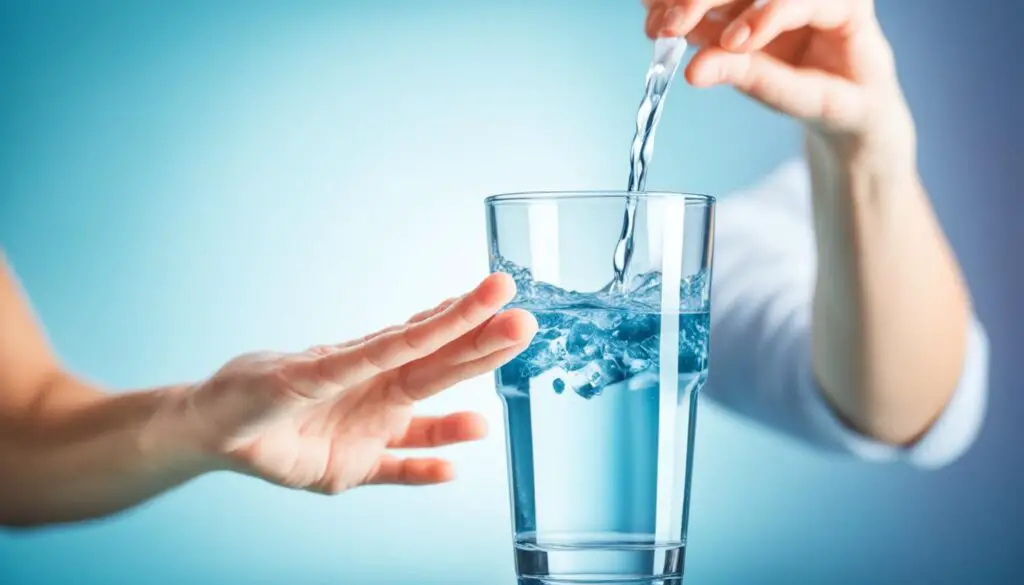
Water plays a significant role in appetite control on the HCG Diet. By drinking an adequate amount of water, you can experience several benefits that contribute to managing your hunger and cravings.
Firstly, drinking water can help increase gastric motility, which is the movement of food through the digestive system. When your stomach is empty, it sends signals to your brain, triggering feelings of hunger. By drinking water, you can create a sensation of fullness and delay stomach emptying, thus reducing the frequency of hunger pangs.
In addition, staying well-hydrated can help you distinguish between true hunger and thirst. Oftentimes, the body’s thirst signals can be mistaken for hunger, leading to unnecessary snacking and calorie intake. By regularly hydrating yourself, you can better understand your body’s needs and avoid consuming excess calories.
“Drinking water before meals can effectively reduce calorie intake and promote weight loss.”
Furthermore, dehydration can have negative effects on your appetite. When you are dehydrated, your body may send mixed signals between thirst and hunger, increasing the likelihood of overeating. By maintaining proper hydration levels, you can prevent these confusion and ensure that you are properly fueling your body.
Overall, drinking water to feel full and managing your thirst levels is essential for appetite control on the HCG Diet. It can help you differentiate between genuine hunger and thirst, reduce calorie intake, and support your weight loss efforts.
Key Takeaways:
- Drinking water can increase gastric motility and create a feeling of fullness, reducing hunger pangs on the HCG Diet.
- Staying well-hydrated helps distinguish between true hunger and thirst, preventing unnecessary snacking.
- Dehydration can disrupt appetite signals and lead to overeating, emphasizing the importance of proper hydration.
Conclusion
Staying hydrated is crucial for a safe and effective weight loss journey on the HCG Diet. Dehydration can have various negative effects on your progress and overall well-being. By implementing proper hydration strategies, such as ensuring you drink enough water, consuming mineral water, and replenishing electrolytes, you can prevent dehydration and optimize your results on the HCG Diet.
Prioritizing your water intake is essential. It’s important to listen to your body’s signals and pay attention to your hydration levels. By staying well-hydrated, you can prevent potential side effects, maintain electrolyte balance, and support your body’s natural processes.
Remember, dehydration on the HCG Diet can hinder your weight loss progress and impact your overall health. Make it a priority to follow these hydration guidelines, incorporating them into your daily routine. By doing so, you’ll ensure a safer and more successful weight loss journey on the HCG Diet.
FAQ
What are the risks of dehydration on the HCG Diet?
Dehydration is a known side effect of the HCG Diet and can lead to electrolyte imbalances, low energy levels, and potential health risks.
What are the symptoms of dehydration on the HCG Diet?
Symptoms of dehydration include thirst, dry mouth, fatigue, dizziness, and muscle cramps.
How can I prevent dehydration while on the HCG Diet?
Prevent dehydration by ensuring you drink enough water throughout the day and consider drinking mineral water that contains essential electrolytes. Adding a small amount of sea salt to your water can also prevent electrolyte imbalances and alleviate muscle cramps.
How much water should I drink on the HCG Diet?
It is recommended to drink at least two liters or half a gallon of water per day on the HCG Diet to support weight loss and hydration.
What type of water should I choose on the HCG Diet?
To stay hydrated, it is advised to drink plain or mineral water. Mineral water provides essential electrolytes and antioxidants. Avoid carbonated water with additives or sweeteners like aspartame.
What are the signs of proper hydration on the HCG Diet?
Signs of proper hydration include pale urine, stable body weight, moist mouth, absence of frequent headaches, and a general feeling of well-being.
How does water intake affect appetite control on the HCG Diet?
Drinking an adequate amount of water can increase gastric motility, delay stomach emptying, and create a feeling of fullness, helping control appetite on the HCG Diet.
How important is proper hydration on the HCG Diet?
Staying hydrated is essential for a safe and effective weight loss journey on the HCG Diet. Dehydration can lead to various side effects and hinder progress.


